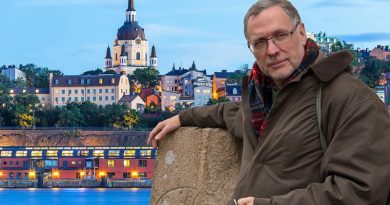Agneta Rising, World Nuclear Association
After more than 30 years at Vattenfall in Sweden, Agneta Rising, then 58, packed her bags and moved to London to become Director General at the World Nuclear Association. Swedish Press spoke to Rising about her new job responsibilities, future goals and how she handles any naysayers.
Describe your role as a Director General for the World Nuclear Association.
I became Director General of the World Nuclear Association in London on January 1, 2013. Our association works with industrial companies, representing the nuclear industry globally. My main responsibilities consist of:
1. Representing the nuclear power industry
2. Gathering and distributing information and facts
3. Organizing and leading nuclear industry cooperation
4. News services
The World Nuclear Association works to eliminate barriers against nuclear power. We also gather information and publish balanced facts on our website. We are very pleased with the fact that a lot of ministers, professors and students use the information available on our website.
Please tell us a little bit about your background.
I was born and raised in Lund. I studied mathematics, physics and radiation physics, which at the time was a very small subject/focus area at the University of Stockholm. During the summer while at university, I worked at the Swedish energy company Vattenfall AB (then Swedish State Power Board). In 1980, I became a full-time employee.
My 30-year career at Vattenfall centered on radiological protection. I had an office in Stockholm but was partly stationed at Ringhals kärnkraftsverk (nuclear power plant) on the west coast. While at Vattenfall, I was the leading specialist on nuclear energy and the environment. During my first ten years, I worked as a specialist in environmental issues related to nuclear power. For the next decade, I was still in the role of a specialist but was also responsible for communicating and building confidence in nuclear energy, especially related to health and the environment. At this time, I held the position of director of nuclear business development. During my last ten years, I served as Vice President of Environment, acting as head of the department that deal with the environmental impact of all energy sources such as coal, gas, wind power, hydro power, solar energy and nuclear power and several more.
In May 2000, I became chairman of the Uranium Institute and presided over its transformation into the World Nuclear Association in 2001.
I am also co-founder and former president of Women in Nuclear (WIN). During my WIN presidency, the organization quadrupled in size. I have also been president of the European Nuclear Society and president of the Swedish Nuclear Society.
During the past two decades, I have been appointed by the Swedish government, the EU Commission and the Inter-national Atomic Energy Agency to several significant expert and advisory positions relevant to the safety and future development of nuclear power. Among these, I served for four years on the IAEA’s International Nuclear Safety Group.
Nuclear energy is a controversial subject. You must meet with opponents once in a while. How do you handle the criticism?
I always listen carefully to criticism; it’s a good opportunity for learning. Sometimes it’s also an opportunity to meet concerns that people might have about nuclear power. If both sides are prepared to listen it will be a good and fruitful exchange. Now and then there are opponents who are aggressive and unfortunately such meetings do not lead to much progress.
Define where the Nuclear industry is today.
In 2014 the nuclear power industry turned 60 years old. Nuclear power is developing differently throughout the world. The major goal that we have set to achieve by 2050 is to have 25 percent of all electricity in the world generated by nuclear power. In order for that to happen we have to work globally and ensure that decisions are taken properly in every country. We provide interested and newcomer countries as well as countries that have not yet considered the nuclear power option with valuable information and possibilities to learn from experienced companies.
What has been Sweden’s role in the advancement of safe nuclear energy?
Historically, Sweden has been a leader in industrial quality and human safety. This culture has also formed the cornerstones in our development and adaption of nuclear power. We have been prominent in our work by providing solutions to safety issues connected to nuclear power generation. Sweden has also been a leader in the field of safe computing, communication and transportation for a long time.
Do you think the image of Sweden is changing and developing internationally?
We still have a strong environmental profile in Sweden and we want to do good. While this remains, the people are changing. We have gone from a collectivist society to an individualistic one. Today we value tolerance and freethinking. We were once a quite rigid country, encouraging people to act and look the same, which has been perceived as pretty boring. Today the individual is being championed in all fields, such as science, technology, music, arts, and literature.
How do you think Sweden has achieved the success it has despite being such a small country, population-wise?
Because of our culture. We care about our nature, people and each other. We support parents and their children. We encourage people to develop; in this case, being a small country may be an advantage. Swedes are open minded, inventive and eager to experiment. We have contributed with more major inventions than most other nations have. In addition, we have also succeeded in building world-leading multinational companies around many of those inventions. In fact, no other country has given birth to more multinational per capita than Sweden. As long as individuals are valued in society, even small populations can be big enough to create good development. As long as you stay focused and do the right things, you can manage with limited resources.
You were awarded the Atoms for Peace prize in 2013. How did that feel?
I felt happy and proud! It felt good to be awarded with a prize for making sure people have access to electricity and a clean environment. Nuclear energy contributes to the very much wanted electricity in a clean and reliable way. Having access to those things improves health and quality of life and also reduces friction between people. Altogether, nuclear energy contributes to clean electricity and welcomes prosperity and peace.
The World Nuclear Association’s mission is to promote a wider under-standing of nuclear energy among key international influencers by producing authoritative information, developing common industry positions, and contributing to the energy debate.
Interview by Sofie Kinnefors
First published August 17, 2017






